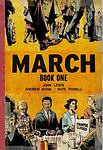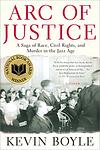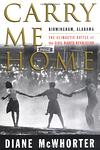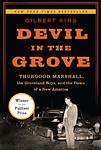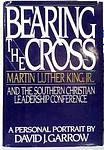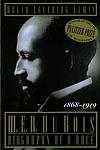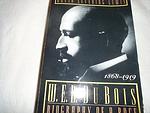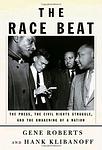The Greatest "American History, Civil rights" Books of All Time
Click to learn how this list is calculated.
This list represents a comprehensive and trusted collection of the greatest books. Developed through a specialized algorithm, it brings together 300 'best of' book lists to form a definitive guide to the world's most acclaimed books. For those interested in how these books are chosen, additional details can be found on the rankings page.
Genres
The "American History" category encompasses a broad range of books that delve into the events, figures, and forces that have shaped the United States from its pre-colonial days to the present. This genre includes works on pivotal moments such as the American Revolution, Civil War, and civil rights movements, as well as studies of political, social, and cultural developments across various eras. It covers biographies of influential leaders, analyses of policy changes, and examinations of societal shifts. Whether providing comprehensive overviews or focusing on specific incidents or decades, books in the American History category aim to illuminate the complexities of the nation's past, offering readers insights into the events that have defined the American experience and the context for its ongoing evolution.
The category of "Civil rights" books encompasses literature that explores the struggles and triumphs of marginalized groups in their fight for equal rights and social justice. These books often focus on historical events and figures, such as the Civil Rights Movement in the United States, and examine the impact of discrimination, racism, and prejudice on individuals and society. They also highlight the importance of activism, advocacy, and community organizing in promoting change and advancing civil rights. Overall, Civil rights books provide a powerful lens through which to understand and engage with issues of social justice and equity.
Countries
Date Range
Reading Statistics
Click the button below to see how many of these books you've read!
Download
If you're interested in downloading this list as a CSV file for use in a spreadsheet application, you can easily do so by clicking the button below. Please note that to ensure a manageable file size and faster download, the CSV will include details for only the first 500 books.
Download-
1. Rights of Man by Thomas Paine
This influential work is a passionate defense of the French Revolution and a detailed examination of the concept of human rights. The author argues against the idea of monarchy and hereditary succession, contending that government should be a reflection of the people's will and that it should promote equality and social welfare. The book also explores the role of government in society, the nature of civil liberties, and the importance of a written constitution.
-
2. The Fire Next Time by James Baldwin
This book is a powerful exploration of race relations in America in the early 1960s. The author presents his experiences and observations in the form of two essays. The first is a letter to his 14-year-old nephew, discussing the role of race in American history. The second essay takes a broader look at the civil rights movement and the author's own experiences with religion and identity. Throughout, the author presents a passionate plea for the recognition of the humanity and dignity of all people, regardless of race.
-
3. Why We Can't Wait by Martin Luther King
This book is a powerful exploration of the civil rights struggle in the United States in the early 1960s, as seen through the eyes of one of its most prominent figures. It provides a historical context for the push for racial equality, including the role of nonviolent protest in achieving social change. The book also includes a detailed account of the 1963 Birmingham campaign, a pivotal moment in the civil rights movement, and presents a compelling argument for the urgency of addressing racial injustice.
-
4. Parting the Waters by Taylor Branch
"Parting the Waters" is a comprehensive and engaging chronicle of the civil rights movement in America from 1954 to 1963. It offers an in-depth look into the lives of key figures such as Martin Luther King Jr., and their struggle to end racial segregation and discrimination. The narrative is filled with detailed accounts of major events from the Montgomery Bus Boycott to the March on Washington, providing a vivid picture of this pivotal era in U.S. history.
-
5. The Strange Career of Jim Crow by C. Vann Woodward
This historical analysis examines the history and development of racial segregation laws, known as "Jim Crow", in the United States. It explores the origins of these laws in the post-Civil War era, their enforcement in the South, and the eventual resistance and dismantling of them during the Civil Rights Movement. The book also challenges the perception that segregation was a natural outcome of racial tensions, instead arguing that it was a system carefully constructed by white elites to maintain economic and political control.
-
6. Common Ground by J. Anthony Lukas
"Common Ground" is a non-fiction book that provides an in-depth examination of racial tensions in Boston, Massachusetts during the 1960s and 1970s, primarily focusing on the controversial issue of court-ordered busing to integrate public schools. The narrative follows three families - one African-American, one Irish-American, and one Yankee - to depict the effects of these tensions on the city's different communities. The book also explores the historical, political, and social context of these events, offering a comprehensive analysis of a critical period in American history.
-
7. March: Book One by John Lewis
"March: Book One" is a graphic novel that depicts the early life of a key figure in the American civil rights movement. Raised in rural Alabama, he grows up inspired by the activism surrounding the Montgomery Bus Boycott and the words of Martin Luther King Jr., which sets him on the path of nonviolent protest. The novel highlights his commitment to the fight for equal rights and his journey from a young boy on a farm to one of the key figures in the civil rights movement.
-
8. Arc of Justice by Kevin Boyle
"Arc of Justice" is a riveting and complex story that unfolds in the racially tense backdrop of 1920s Detroit. The narrative follows an African American physician who moves his family into a predominantly white neighborhood, resulting in a chain of violent events. The doctor stands trial for murder, and the case garners national attention. The book delves into the doctor's fight for justice and the broader societal implications of racial tension, prejudice, and civil rights in America.
-
9. A Testament of Hope: The Essential Writings and Speeches of Martin Luther King, Jr. by Martin Luther King
This book is a comprehensive collection of the significant writings and speeches of a renowned civil rights leader. It includes his most influential and inspirational works, such as the "I Have a Dream" speech and the "Letter from Birmingham Jail", among many others. The book provides a deep insight into his thoughts, philosophies, and strategies for nonviolent protests, and his passionate advocacy for equality, justice, and dignity for all. It serves as a testament to his enduring hope for a more inclusive and equitable society.
-
10. Slavery by Another Name by Douglas A. Blackmon
The book explores the concept of "neoslavery," which entrapped thousands of African Americans in the South in a system of forced labor after the Civil War. This system was perpetuated by local laws, racial prejudice, and economic manipulation, where black men were arrested on false charges, then sold to companies as cheap labor. The book illuminates the forgotten history of this "age of neoslavery" that persisted into the 20th century and its profound impact on the racial disparities that exist today.
-
11. Sons of Mississippi by Paul Hendrickson
"Sons of Mississippi" is a powerful exploration of the legacy of racism in the American South. The book uses a famous photograph of seven Mississippi sheriffs preparing to thwart James Meredith's integration of the University of Mississippi in 1962 as a starting point. The author then traces the lives and descendants of these men, providing a deep and nuanced look at the enduring effects of prejudice and discrimination, as well as the struggle for civil rights and racial equality in the United States.
-
12. Freedom by Orlando Patterson
"Freedom" is an in-depth exploration of the concept of freedom throughout human history, beginning with ancient civilizations and leading up to modern times. The author analyzes how the idea has evolved and been interpreted by different cultures and societies, arguing that freedom is a socio-cultural construct rather than an inherent human right. The book also explores the paradoxical relationship between freedom and slavery, suggesting that the concept of freedom often emerged from societies where slavery was prevalent.
-
13. Carry Me Home by Diane McWhorter
"Carry Me Home" is a deeply researched historical account of the civil rights movement in Birmingham, Alabama, during the 1960s. The book provides a comprehensive look at the racial tensions and violence that marked this period, focusing on key events such as the bombing of the Sixteenth Street Baptist Church. The author, who grew up in Birmingham, also interweaves personal experiences and family history into the narrative, offering a unique perspective on the complex social and political dynamics of the time.
-
14. Devil in the Grove: Thurgood Marshall, the Groveland Boys, and the Dawn of a New America by Gilbert King
The book is a gripping account of the Groveland Boys, four African American men falsely accused of raping a white woman in Florida in 1949, and the efforts of Thurgood Marshall, a future Supreme Court justice, to defend them. The narrative delves into the depths of racial injustice and violence in the Jim Crow South, and shows how Marshall's fight for the Groveland Boys helped to lay the groundwork for the Civil Rights Movement and the desegregation of America.
-
15. Booker T. Washington: The Wizard of Tuskegee, 1901–1915 by Louis R. Harlan
This book delves into the life and influence of Booker T. Washington during his time as the head of Tuskegee Institute from 1901 to 1915. The narrative explores Washington's political and social strategies, as well as his controversial policies, as he navigated the complexities of post-Reconstruction America. It also examines his relationships with key figures of the era, his efforts to promote African American education and economic self-reliance, and his enduring legacy in the fight for civil rights.
-
16. Bearing the Cross: Martin Luther King Jr. and the Southern Christian Leadership Conference by David J. Garrow
"Bearing the Cross: Martin Luther King Jr. and the Southern Christian Leadership Conference" is a comprehensive biography of Martin Luther King Jr., focusing on his leadership role in the Civil Rights Movement. The book provides an in-depth analysis of King's philosophy, political strategies, and his relationship with the Southern Christian Leadership Conference. It also explores King's personal struggles, his moral courage, and his unwavering commitment to nonviolent protest in the face of extreme opposition. The book is based on extensive research, including interviews with King's closest associates, government investigations, and surveillance records.
-
17. The Fate of Liberty: Abraham Lincoln and Civil Liberties by Mark E. Neely, Jr
This book explores Abraham Lincoln's approach to civil liberties during the American Civil War. It examines the decisions he made that affected individual rights, such as his choice to suspend habeas corpus, allowing the government to arrest and detain individuals without a trial. The author delves into the complexities of Lincoln's decisions, the context in which they were made, and their impact on the country, offering a nuanced view of a president often hailed as a champion of liberty.
-
18. W.E.B. Dubois : Biography of a Race, 1868–1919 by David Levering Lewis
This biography provides an in-depth look into the life of W.E.B. Dubois, a prominent African-American sociologist, historian, and civil rights activist. The book traces Dubois' life from his birth in 1868 to 1919, detailing his upbringing, education, and his significant contributions to the civil rights movement. It offers a comprehensive portrait of his ideologies, personal struggles, and his tireless fight for racial equality, making it an essential read for those interested in American history and race relations.
-
19. W.E.B. Du Bois: The Fight for Equality and The American Century by David Levering Lewis
This biography delves into the life of W.E.B. Du Bois, a prominent African-American civil rights activist and scholar. It explores his tireless fight for racial equality in the United States during the 20th century. The book chronicles his role as a founder and leader of the NAACP, his influence in the Harlem Renaissance, his controversial advocacy for black separatism, and his later years as an expatriate in Ghana. It paints a comprehensive picture of Du Bois as a key figure in the struggle for civil rights and the shaping of the American century.
-
20. A Nation under Our Feet by Steven Hahn
"A Nation Under Our Feet" is a comprehensive study of African American political history during the 19th century, particularly from the Civil War to World War I. The book explores the struggle of African Americans to gain and sustain political power within the American democracy. It highlights their journey from slavery to freedom, the establishment of their own institutions and political movements, and their resistance to both subtle and overt forms of disenfranchisement. The book provides a detailed analysis of the black political consciousness and its impact on the American political landscape.
-
21. The Race Beat by Gene Roberts, Hank Klibanoff
"The Race Beat" is a historical exploration of the crucial role that the press played in the civil rights movement in the United States. The book delves into the challenges faced by journalists, both white and black, as they covered the struggle for racial equality in the South during the 1950s and 1960s. It highlights the impact of their stories on shaping public opinion and influencing policy changes, while also examining the tactics used by segregationists to control the narrative.
-
22. The Fiery Trial: Abraham Lincoln and American Slavery by Eric Foner
This book explores Abraham Lincoln's complex relationship with the institution of slavery, tracing his evolution from a moderate who sought to gradually abolish slavery to a radical who believed in immediate emancipation. It delves into his personal, political, and public life, his speeches, and his private correspondence to reveal a man grappling with the moral, legal, and social implications of slavery in a nation founded on the principle of freedom. The book provides a detailed examination of Lincoln's role in the abolition of slavery and the Civil War, offering a nuanced understanding of his legacy.
Reading Statistics
Click the button below to see how many of these books you've read!
Download
If you're interested in downloading this list as a CSV file for use in a spreadsheet application, you can easily do so by clicking the button below. Please note that to ensure a manageable file size and faster download, the CSV will include details for only the first 500 books.
Download





